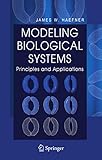Modeling Biological Systems : Principles and Applications / by James W. Haefner.
Tipo de material: TextoEditor: Boston, MA : Springer US, 2005Edición: Second EditionDescripción: XVI, 480páginas, 180 illus. recurso en líneaTipo de contenido:
TextoEditor: Boston, MA : Springer US, 2005Edición: Second EditionDescripción: XVI, 480páginas, 180 illus. recurso en líneaTipo de contenido: - texto
- computadora
- recurso en línea
- 9780387250120
- QH301-705
Springer eBooks
Principles -- Models of Systems -- The Modeling Process -- Qualitative Model Formulation -- Quantitative Model Formulation: I -- Quantitative Model Formulation: II -- Numerical Techniques -- Parameter Estimation -- Model Validation -- Model Analysis: Uncertainty and Behavior -- Stochastic Models -- Applications -- Photosynthesis and Plant Growth -- Hormonal Control in Mammals -- Populations and Individuals -- Chemostats -- Diseases -- Spatial Patterns and Processes -- Scaling Models -- Chaos in Biology -- Cellular Automata and Recursive Growth -- Evolutionary Computation.
This extensively revised second edition of Modeling Biological Systems: Principles and Applications describes the essentials of creating and analyzing mathematical and computer simulation models for advanced undergraduates and graduate students. It offers a comprehensive understanding of the underlying principle, as well as details and equations applicable to a wide variety of biological systems and disciplines. Students will acquire from this text the tools necessary to produce their own models. The text contains two major sections: Principles and Applications. The first section discusses the principles of biological systems with a thorough description of the essential modeling activities of formulation, implementation, validation, and analysis. These activities are illustrated by a set of example models taken from recent and classical literature, chosen for their breadth of coverage and current timeliness. The new edition updates extensively many of these topics, especially quantitative model formulation, validation and model discrimination using information theory measures and Bayesian probability, and stability analysis and non-dimensionalization.
Para consulta fuera de la UANL se requiere clave de acceso remoto.


